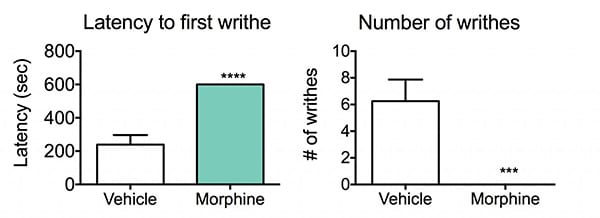IBS Model and Acetylcholine Writhing Model
Discover how Melior’s unique phenotypic screening platforms can uncover the untapped value of your candidate therapeutic
Irritable Bowel Syndrome (IBS) is a syndrome that is expressed as abdominal cramping, gastrointestinal pain and disturbances in GI transit. These conditions are produced by colonic spasticity and irregular contractility.
The disturbances in GI transit can be modelled by examining expulsion of a colonically-inserted glass bead or the Charcoal Meal model. The cramping and pain component of IBS can be modelled by injecting acetylcholine (ACh) into the peritoneum of mice. Intra-peritoneal administered acetylcholine promotes smooth muscle contractility and can be monitored, in animals, by quantifying the writhing response. Therefore, the Acetylcholine Writhing Model serves both as a gastrointestinal function model (an IBS model) as well as a representative of animal models for pain.
In this study, the acetylcholine (ACh) writhing response was validated as a model of smooth muscle contractility and visceral pain. This model was validated using Morphine as a reference anti-nociceptive compound.
Ready to get started or looking for a custom model?
Contact us today for more information about our bespoke research models and to discuss how we can help you answer your unique research questions.
IBS Model and ACh Writhing Assay. CD1 mice were treated with vehicle or Morphine (9mg/kg) 30 minutes prior to testing. The animals were injected with acetylcholine and placed in an observational chamber. The latency to writhe and the number of writhes were recorded over a period of 600 seconds. Writhing was completely absent in mice administered Morphine. Vehicle-treated animals had an average of 6.25 writhes and a latency of approximately 240 seconds to the first writhe. These data illustrate that this model may be useful for identifying test agents that have therapeutic potential for treating abdominal discomfort/pain. Data are mean ± SEM; ***p<0.001, ****p<0.0001compared to vehicle (N=12).
The Acetylcholine Writhing IBS Model of pain is typically run in an acute mode (study completed in one day) by evaluating test articles after a single administration. The variability is relatively low and statistical significance may be achieved with group sizes of about 8 to 10 animals. It can be performed in both mice and rats.


 Interested in running an Acetylcholine Writhing study?
Interested in running an Acetylcholine Writhing study?